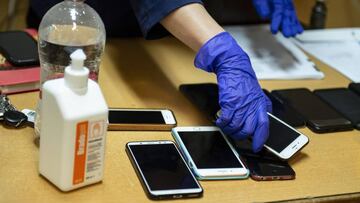Third Stimulus Check: can my Social Security Number be suspended and what to do?
Throughout the pandemic instances of fraud against recipients of government support have been on the rise. Here's how to spot one of the most common ploys.


The Social Security Administration’s national ‘Slam the Scam’ day on 4 March came as an increasing number of Social Security recipients reported getting unsolicited phone calls requesting personal information.
The calls often claimed that the recipient's Social Security Number had been ‘suspended’, and asked for important details or even financial payments to get it reinstated. However these calls are all fraudulent and represent a recent increase in scammers looking to swindle people out of their stimulus checks and other forms of government support.
Scammers target Social Security recipients
To help Americans struggling through the economic consequences of the pandemic, the federal government has spent trillions of dollars to provide financial support for those in need. The money may come in the form of stimulus checks, additional unemployment benefits or extra tax refunds, and scammers are targeting these payments.
Biden’s $1.9 trillion economic stimulus package will send billions of dollars to America’s jobless. It’s also a potential bonanza for scammers. https://t.co/KeUxhTxiBf
— Businessweek (@BW) March 23, 2021
The Social Security Number ‘suspension’ scam is one of the latest to be uncovered, where fraudsters often claim that they need money or personal details to facilitate a stimulus check payment. However the Federal Trade Commission are very clear on the subject and advise that this will never be the case:
“Social Security numbers do not get suspended. This is just a variation of a government imposter scam that’s after your SSN, bank account number, or other personal information.”
The situation is not helped by the recent delay to stimulus checks for Social Security claimants, which has left many wondering why their $1,400 payment has not yet arrived. In response to this delay, members of the House Ways and Means Committee have demanded IRS Commissioner Chuck Rettig and Social Security Administration Commissioner Andrew M. Saul provide an update on stimulus checks by Friday.
Over 200,000 Americans hit by covid-related fraud
Unfortunately these ploys targeting the Social Security system are far from the only type of fraud that has soared during the pandemic as scammers look to steal vital government support from recipients’ pockets.
A recent report from the Federal Trade Commission found that more than 217,000 people had filed a covid-related fraud claim since January 2020. In total an estimated $382 million has been stolen with a median loss of $330. Tragically, seniors were hit hardest with those in their 80s losing around $900 on average.
With the third round of stimulus checks being delivered, make sure to watch out for scams! Read more about Stimulus Payment Information here: https://t.co/SYHfCvvhmi pic.twitter.com/cFv3duRrP4
— Royal Credit Union (@Royal_CU) March 20, 2021
This data is based on incidents reported by consumers so it is likely that the figures actually underestimate the size of the problem. Government officials have advised anyone who receives unsolicited calls regarding Social Security to simply hang up.
Related stories
“For the past year, we have seen a steady increase in Social Security-related scam calls,” said Acting U.S. Attorney Nicholas J. Ganjei. “The financial exploitation of older Americans will not be tolerated. We are partnering with the Social Security Administration Office of the Inspector General to spread the word about these scams. We encourage anyone who receives such calls to hang up.”
For more information on what to look out for and how to deal with suspicious calls, texts or emails, the US Attorney’s Office and SSA-OIG have some helpful information on how to spot these scams.

